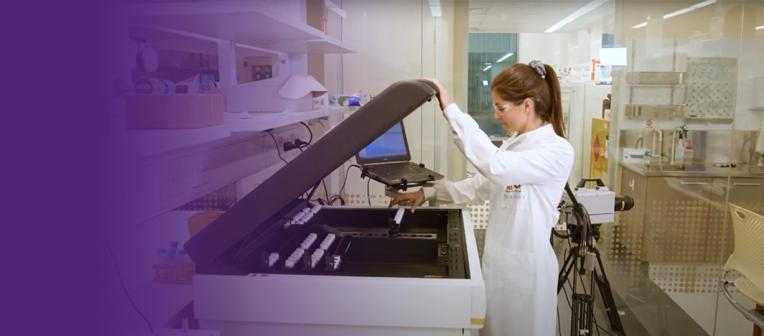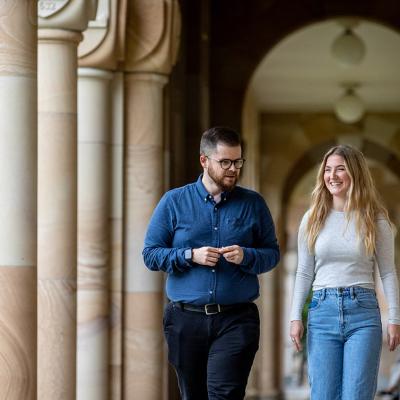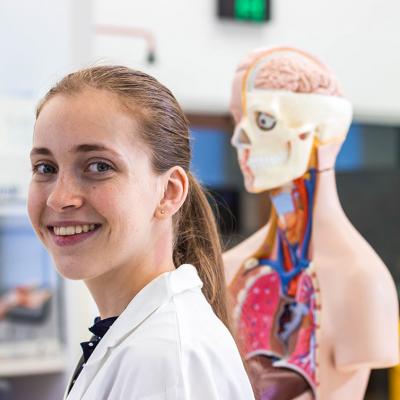Biomedical engineering careers are expected to grow in demand over the coming years as investment continues to be centred on healthcare in our post-pandemic world.
This is great news for anyone considering pursuing studies and a subsequent career in this field. However, biomedical engineering can seem like one of those mysterious occupations with a lot of nuances that aren’t widely broadcasted. So, what does a biomedical engineer do, exactly?
We’re going to take a closer look at this exciting career path with a little help from UQ alum and biomedical engineering graduate, Talia Rose.
Talia works as a senior medical device engineer at Vaxxas, a Brisbane-based biotechnology company committed to transforming the way vaccines are distributed and administered by commercialising a needle-free technology. Read on to hear about her experiences as a biomedical engineer and what you can expect to encounter day to day in this occupation.
What do biomedical engineers do on a daily basis?
When we asked Talia this question, her initial response was “so many different things!”. The role is varied, to say the least.
“Lots of people don't know what biomedical engineers do and that is because, like most types of engineering, there are so many possibilities!”
"Depending on the role and team I have been a part of, I have had very different day-to-day experiences within the same company,” she says.
When Talia first started at Vaxxas, she was working in the Research and Development (R&D) team and spent much of her time on experiments and lab work. She gradually moved into a position where she was focused on engineering design. Here, her work became more computer-based.
As a graduate biomedical engineer, you may be more likely to find yourself testing, creating or repairing medical devices on a daily basis.
“I have previously worked in medical device repair in Cambodia and Nepal,” Talia says.
“In this role, I was coordinating programs that repaired medical equipment located in hospitals.”
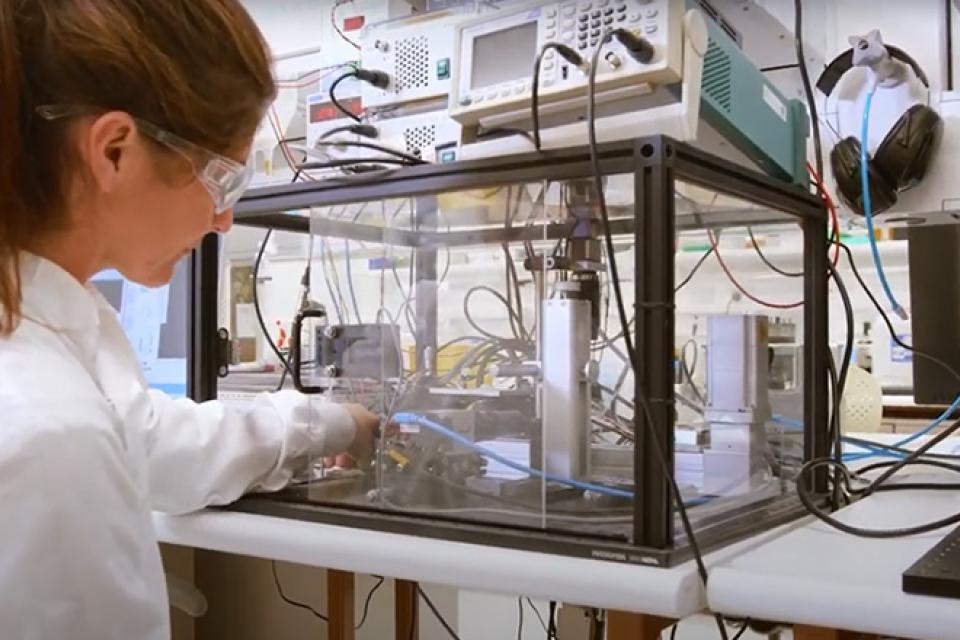
Biomedical engineer job growth
As Talia has progressed into leadership positions, she has found more of her time is spent on carrying out managerial duties. This involves documentation writing, strategy and leading a team.
“In engineering there are broadly two progression pathways,” she explains.
“One is as a technical engineer, progressing from a graduate to an engineer, a senior engineer, and then a principal engineer. The other path is more in management and leadership, which requires you to lead teams and people.”
Talia has decided to take her career in the direction of leadership progression but emphasises that biomedical engineers have the flexibility to pick paths that suit their strengths and interests.
What do biomedical engineers make?
All kinds of amazing things! Biomedical engineers have made some of the most life-altering medical equipment around. They're consulted in the creation of prosthetics, implants and drug delivery systems. In fact, Talia is currently working on a device that could change the way we roll out vaccines forever.
“We're developing a platform that allows vaccines to be given via a small dermal patch, rather than using a needle and syringe."
“The patch is covered with thousands of tiny microprojections that are only half a millimetre in length, and similar in width to a strand of hair. The vaccine is coated onto the tip of each projection,” she says.
This type of device could not only be life changing for members of the public with trypanophobia (fear of needles) but could also improve the efficiency of future responses to pandemics like the coronavirus.
“I have been a part of the technical design team for the last 3 years as we refine the design to be used in clinical trials and eventually in healthcare settings,” says Talia.
“I’m now leading Vaxxas’ work on human factors engineering, to ensure the medical device we design is intuitive and safe for users to operate.”
Watch this video of Talia explaining her role at Vaxxas, during the first stages of her career in 2020.
Where do biomedical engineers work?
“I think one thing that people don't realise is the possible breadth of biomedical engineering,” says Talia.
People's first question tends to be ‘do biomedical engineers work in hospitals?’, and while the answer is yes, they can also work in a variety of other settings too.
“Biomedical engineers can work in industry and in research, in hospitals and in labs,” she says.
“If you think of a hospital setting, literally everything in that hospital will have had a medical engineer work on it – giant MRI machines, tiny pumps for medication, beds, wheelchairs, tubing for an IV, everything in an operating theatre, vaccines or blood storage – anything and everything!”
“Then you also have lots of medical implants – cochlear implants for hearing, stents for blood flow or tiny metallic pins for fixing bones.”
But these items aren’t typically created in a hospital, even if they’re frequently used there – they have to be designed, prototyped, tested and put through stringent procedures to ensure they’re safe to use first.
Biomedical engineers create, install, repair and maintain these medical devices, and this can mean working in a range of healthcare settings, as well as in factories and labs. Biomedical engineers can work for private companies, not-for-profits and local, state and national governments.
Like Talia said, it really comes down to where you want to take your career, and what strand of the field you’re most interest in.
Biomedical engineer responsibilities and skills: what’s important?
As is the case with any profession involved in improving human health, Talia notes that biomedical engineering is a highly regulated industry.
“That means there is always significant emphasis on the amount of documentation you have to do, and the procedures you follow, not just the fun hands-on lab and design work,” she says.
“I think it is important that someone considering a career in biomedical engineering understands that documentation, understanding regulation and standards and adhering to what is called a ‘quality management system’, which allows you to control your design process to create a safe and effective product, is a significant part of the job too.”
For this reason, attention to detail and the ability to follow procedures is important. But that doesn’t mean you won’t have the freedom to explore big ideas too.
“I know engineers with great attention to detail which is important for their role, and others that think much more broadly about strategy and vision which is important for their responsibilities,” says Talia.
According to Labour Market Insights, here are some other skills that will set you up for a thriving career in biomedical engineering:
- reading comprehension
- critical thinking
- problem solving
- judgement and decision making.
Learn how UQ’s Bachelor of Engineering (Honours), majoring in biomedical engineering can teach you these essential skills and prepare you for a career in this field.
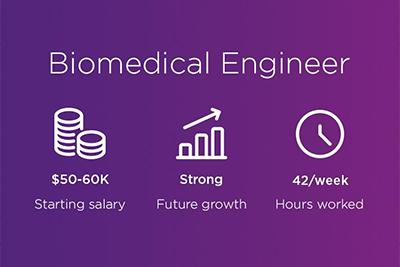
Information sourced from Jobted, Payscale, Your Career and Labour Market Insights.
How much do biomedical engineers make?
The starting salary for a biomedical engineer can range from around $50-60,000 a year in Australia. Mid-career biomedical engineers typically have an average salary of around $80,000 a year, while experienced employees could earn salaries in the $100-130,000 a year mark.*
Please note that salaries may vary based on sector and role progression pathways.
*information sourced from Jobted and Payscale.
Is biomedical engineering a good career for work/life balance?
When it comes to workplace flexibility, Talia commends Vaxxas’ policies, which allow her to work a 9-day fortnight, work from home on select days and alter her start and finish times, provided it works with the rest of her team.
“This ability to work a 9-day fortnight has been great to improve my work/life balance,” she says.
“I very rarely work super long days, and I don't work on weekends.”
She does acknowledge, however, that every workplace is different, and managing a positive work/life balance is the responsibility of the individual, as well as the employer.
According to Labour Market Insights, biomedical engineers consistently work full-time hours (an average of 42 hours per week in this industry), regardless of their type of employment or number of jobs.
“Around 90% of people employed as biomedical engineers work full-time hours, in all their jobs combined. This is 24 percentage points above the all jobs average (66%).”
So, the good news is that there doesn’t seem to be a shortage of work for biomedical engineers. This means that upon graduation, you may find more opportunities to shop around for an employer whose workplace policies align with your own needs and values.
Are biomedical engineers in demand?
There’s strong future demand for biomedical engineers in Australia and around the world due to a number of factors, including an aging population and in response to the coronavirus pandemic.
Being able to respond more efficiently to viruses such as the coronavirus in the future is paramount, making the work of biomedical engineers like Talia incredibly important.
But what’s it like for graduates entering the job market now?
“There are a number of established companies in Brisbane that employ biomedical engineers, also called medical device engineers, such as Cochlear and Cook Medical,” says Talia.
“In the last 5 years there have also been a large number of biotechnology companies that have grown in size, so there are a lot more employment opportunities in that space too.”
Talia also pinpoints the employability benefits of studying a dual major in UQ's Bachelor of Engineering (Honours) for graduates.
“If you cannot initially find a job in biomedical engineering, you have a more generalised skillset to apply for roles that fit with your other major, which can broaden your opportunities across any number of industries.”
Discover UQ’s Bachelor of Engineering (Honours) or explore the other types of careers you can pursue with a university degree in engineering, architecture and information technology.

